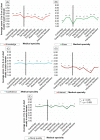Perception of neurology among undergraduate medical students - what can be done to counter neurophobia during clinical studies?
- PMID: 37328733
- PMCID: PMC10276433
- DOI: 10.1186/s12909-023-04405-y
Perception of neurology among undergraduate medical students - what can be done to counter neurophobia during clinical studies?
Abstract
Background and purpose: With a global increase in the burden of neurological diseases, the aversion towards neurology (neurophobia) may challenge the sufficient provision of new specialists in this field. We investigated the possible determinants of neurophobia among medical students and its influence on the intent to pursue neurology residency.
Methods: From September 2021 to March 2022, an online questionnaire was distributed to medical students in Lithuania. It included questions about knowledge, confidence, interest, and teaching quality of various medical specialties (including neurology), as well as the willingness to choose neurology for residency.
Results: Eight hundred fifty-two students responded to the survey (77.2% female) - they rated neurology as significantly more difficult than other medical areas and lacked confidence in assessing patients with neurological problems (p < 0.001). However, neurology was selected as one of the most interesting subjects and was reportedly well-taught. The prevalence of neurophobia among respondents was 58.9%. Most of them (207, 87.7%) indicated that neurology professors positively affected their outlook towards this medical specialty - such experience was associated with lower odds of neurophobia (odds ratio (OR) = 0.383, 95% confidence interval (CI) = 0.223 to 0.658). Being less neurophobic (OR = 1.785, 95% CI = 1.152 to 2.767) and having conducted neurology research (OR = 2.072, 95% CI = 1.145 to 3.747) increased the odds of a student being willing to pursue a career in neurology.
Conclusion: Neurophobia was frequent among students in Lithuania and was inversely related to the positive influence by neurology professors. Together with previous research experience in the field, low levels of neurophobia were associated with the inclination to enter neurology residency.
Keywords: Medical education; Neuroanatomy; Neurology; Neurophobia; Online teaching.
© 2023. The Author(s).
Conflict of interest statement
The authors declare no competing interests.
Figures




References
-
- Ridsdale L, Massey R, Clark L. Preventing neurophobia in medical students, and so future doctors. Pract Neurol. 2007;7:116. - PubMed
MeSH terms
LinkOut - more resources
Full Text Sources

